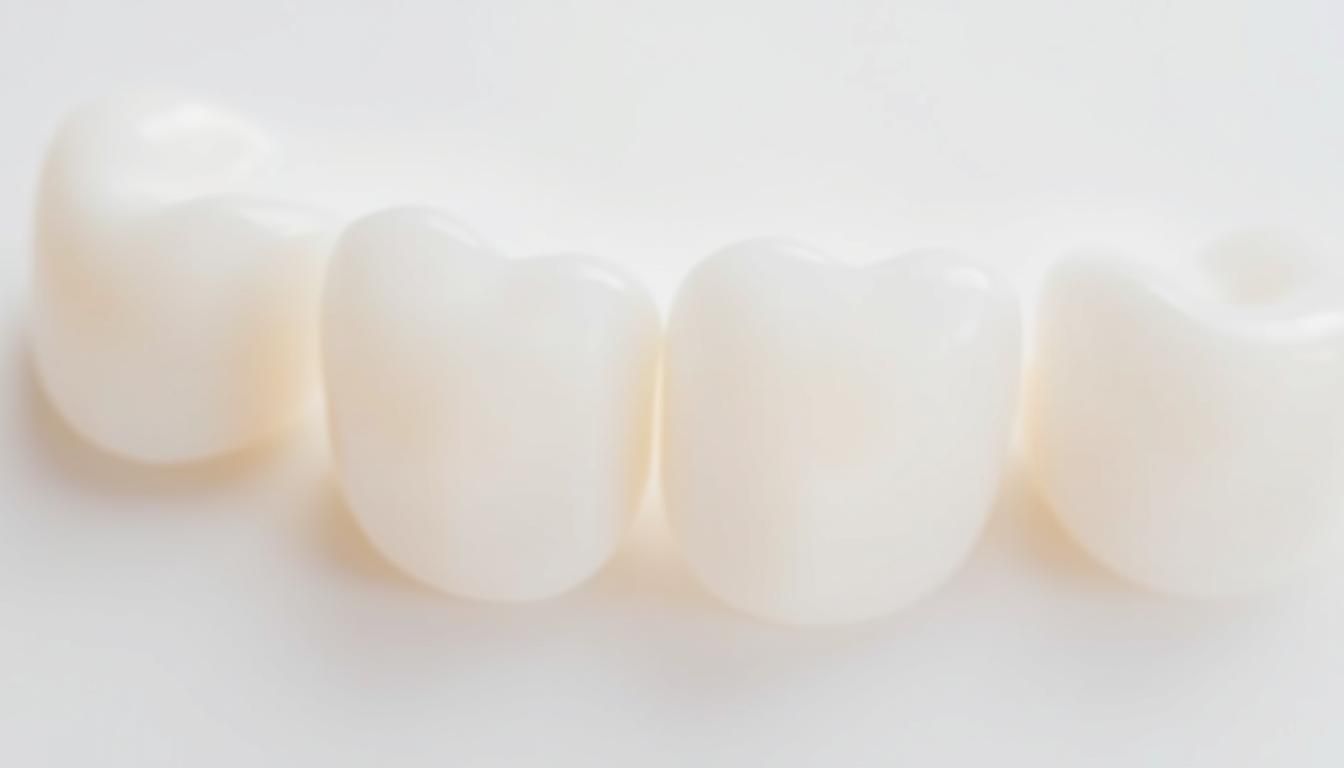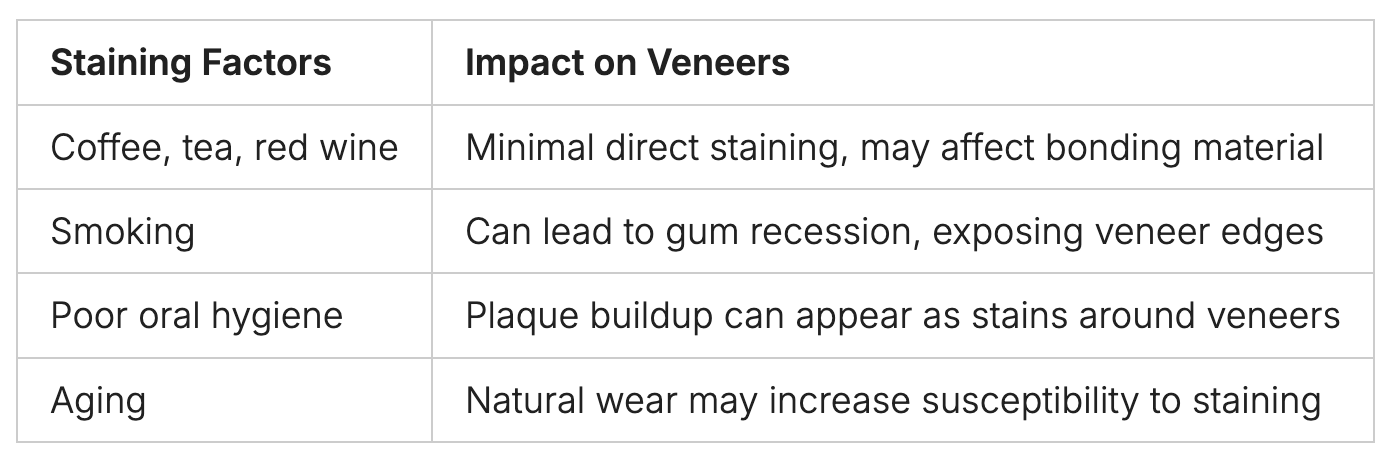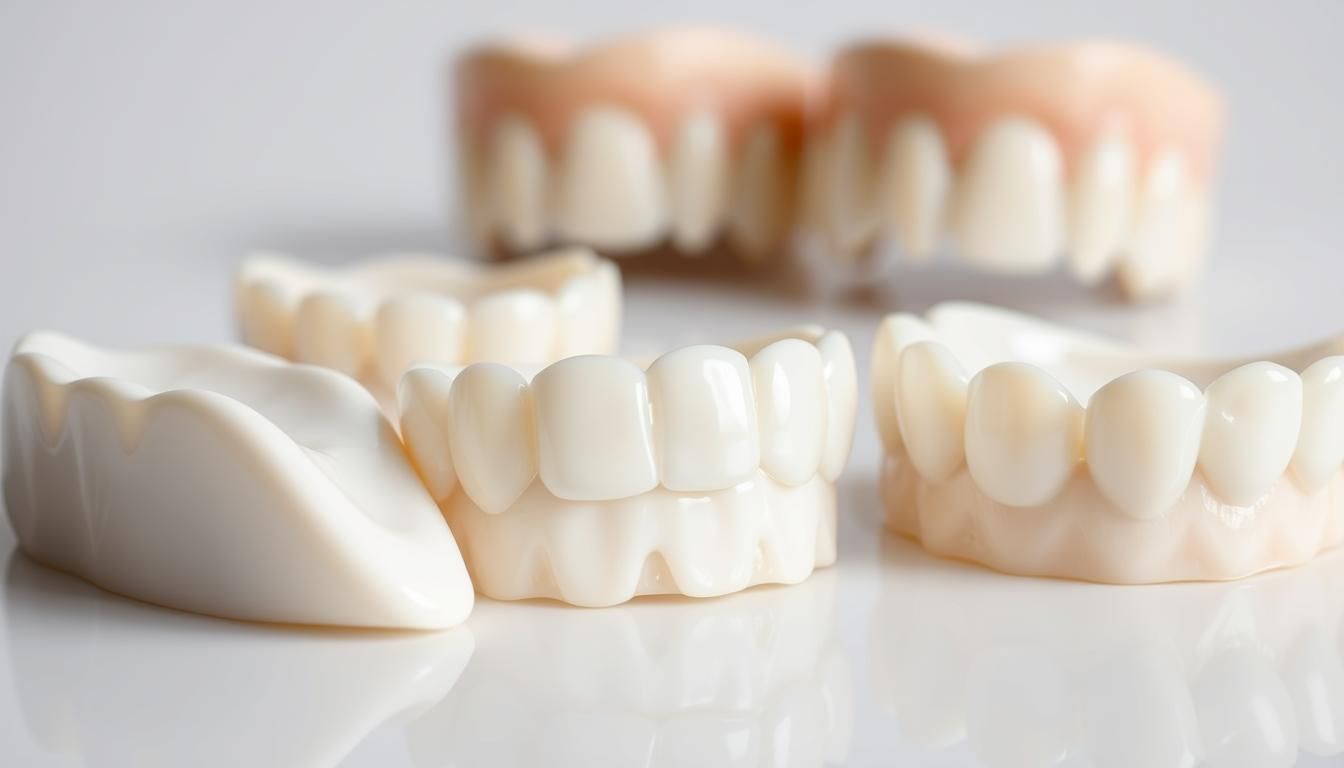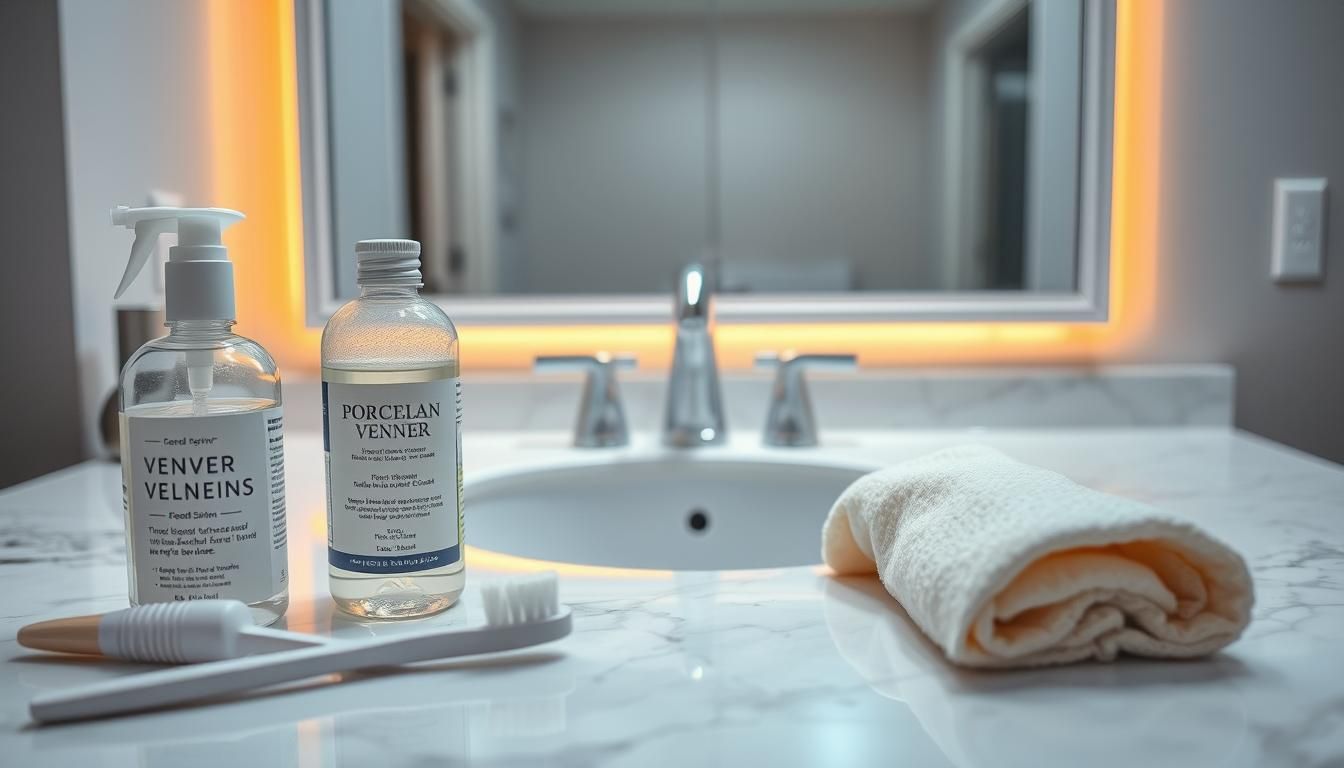New Patients & Dental Emergencies Welcome • We Speak English, Spanish, and Persian • 4444 Connecticut Ave NW, Washington DC, DC 20008 • (202) 363-2810
New Paragraph
Do Porcelain Veneers Stain?
Do Porcelain Veneers Stain?
At DC Implant & Cosmetic Dentistry, we understand that a stunning smile is about more than just appearance—it’s about lasting quality and confidence. Porcelain veneers are a top choice for patients seeking a beautiful, resilient smile. These ultra-thin shells bond seamlessly to your teeth, hiding imperfections and enhancing your overall look. One of the most frequently asked questions is, “Do veneers stain?” The answer is straightforward: porcelain veneers are highly stain-resistant due to their non-porous nature.

While true porcelain veneers hardly stain, issues like gum recession or cracks can make them look discolored. Keeping your teeth clean and visiting the dentist regularly is key to keeping your veneers looking good for years.
Key Takeaways
- Porcelain veneers are highly stain-resistant
- Proper care can extend veneer lifespan to 10+ years
- Gum recession may expose areas prone to staining
- Regular dental check-ups are essential for veneer maintenance
- True discoloration in porcelain veneers is rare
Understanding Porcelain Veneers
Porcelain veneers are a revolutionary option in cosmetic dentistry, offering a minimally invasive way to dramatically enhance your smile. Designed as ultra-thin, custom-made shells, these veneers are bonded directly to the front surface of your teeth, effectively masking imperfections while preserving the natural structure of your underlying teeth.
What Are Porcelain Veneers?
Porcelain veneers are thin shells made of high-quality porcelain that cover the front of your teeth. They help hide stains, chips, and small gaps, giving you a brighter smile. Here are some key points:
- Custom-Made: Each veneer is designed to fit your teeth perfectly.
- Stain-Resistant: Porcelain is non-porous, which means it resists stains.
- Minimally Invasive: Only a small amount of enamel is removed for the veneer.
- Long-Lasting: With proper care, veneers can last 10 to 15 years or more.
At DC Implant & Cosmetic Dentistry, we use the latest technology to create porcelain veneers that look natural and last long.
Benefits of Porcelain Veneers
Porcelain veneers offer many advantages for those looking to improve their smile. Here are some of the main benefits:
- Bright, Natural-Looking Smile: Veneers cover stains and imperfections, making your teeth look clean and natural.
- Stain-Resistant: Because porcelain doesn't soak up liquids, veneers stay whiter longer.
- Durable: With proper care, veneers can last 10 to 15 years, providing a long-term solution for a better smile.
- Minimally Invasive: Only a small layer of enamel is removed, which helps protect your natural teeth.
- Quick Transformation: The process of getting veneers is relatively fast, so you can enjoy your new smile in just a few visits.
Do Porcelain Veneers Stain?
Porcelain veneers are highly resistant to stains due to their non-porous nature, which means the material does not absorb liquids. This helps prevent stains from substances like coffee, tea, or red wine. The smooth, glossy finish of porcelain further aids in keeping the surface clean and bright. In addition, with regular brushing, flossing, and routine dental check-ups, the color and integrity of porcelain veneers remain intact for many years. Although the porcelain itself rarely discolors, it’s important to note that sometimes the bonding cement around the edges may show signs of staining if not properly maintained.
The Science Behind Stain Resistance
Porcelain veneers are made from a non-porous material. This makes them very good at resisting stains. They don't soak up pigments from things like coffee, tea, or red wine. Their smooth surface also helps keep stains away, keeping them looking bright for a long time.
When Veneers May Appear Stained
Even though porcelain veneers are designed to resist stains, there are a few situations where they might appear discolored over time. Here are some factors that can contribute to a stained appearance:
- Bonding Material Discoloration: The resin cement or bonding material used to attach veneers to your teeth can sometimes change color. Over time, exposure to foods, drinks, or even the natural aging process may cause this material to discolor, making the veneer margins appear stained.
- Plaque Buildup: Even with veneers, plaque can accumulate along the gumline and around the edges of the veneers. This buildup not only affects the appearance of your smile but can also lead to inflammation or gum issues if not regularly cleaned.
- Gum Recession: As gums naturally recede with age or due to periodontal issues, the edges of your veneers may become exposed. This exposure can make any discoloration of the bonding material more noticeable, giving the impression that the veneer itself is stained.
- Wear of Surface Glaze: The protective glaze on porcelain veneers is key to maintaining their smooth, stain-resistant finish. Over time, this glaze can wear down, especially if you grind your teeth or use your teeth for habits like biting on hard objects. Once the glaze wears off, the veneer may be more susceptible to surface stains.
- Lifestyle Factors: Certain habits and dietary choices can impact the appearance of veneers over time. For example, smoking introduces tar and nicotine, which can lead to discoloration. Similarly, consuming a lot of coffee, tea, red wine, or other staining foods and beverages can increase the risk of veneers looking less bright.
By understanding these factors and maintaining a consistent oral hygiene routine, you can help keep your veneers looking as fresh and natural as the day they were placed. Regular dental check-ups also allow your dentist to monitor and address any potential staining issues before they become a significant concern.

Going to the dentist regularly and taking good care of your teeth is key. It helps keep your veneers looking great and prevents stains.
How to Whiten Your Veneers
While traditional whitening treatments don’t work on porcelain veneers, there are still several ways to keep them looking bright. Here’s what you can do:
- Professional Cleaning: Regular visits to your dentist for a professional cleaning can remove surface stains and keep your veneers looking pristine.
- Polishing: In some cases, your dentist may polish your veneers to restore their natural shine without altering their color.
- Routine Check-Ups: Scheduling regular dental check-ups helps monitor your veneers’ condition and catch any early signs of discoloration.
- Good Oral Hygiene: Consistently brushing and flossing can prevent plaque buildup that might otherwise contribute to staining.
- Lifestyle Adjustments: Limiting consumption of staining foods and drinks, such as coffee, tea, and red wine, can help maintain the bright appearance of your veneers.
By following these steps, you can ensure your porcelain veneers stay bright and beautiful for years to come.
Limitations of Traditional Whitening Methods
Traditional whitening techniques, such as bleaching, are designed to work on natural tooth enamel and are not effective on porcelain veneers. This is due to several key factors:
- Material Composition: Porcelain is non-porous and does not absorb whitening agents, meaning that treatments like bleaching will not change its color.
- Permanent Coloration: Veneers are custom-colored during the fabrication process. Their shade is set in stone, so traditional whitening methods cannot lighten them further or alter their appearance.
- Potential Color Mismatch: If your natural teeth are whitened with bleaching while your veneers remain unchanged, you may end up with a noticeable color difference between your veneers and the rest of your smile.
- Risk of Damage: Applying strong bleaching agents to veneers is unnecessary and could potentially harm the surrounding gum tissue or the bonding material used to secure the veneers.
In summary, if you’re looking to maintain or restore the brightness of your porcelain veneers, the best approach is through professional cleaning, polishing, and maintaining excellent oral hygiene, rather than traditional whitening treatments.

Keeping your veneers looking good is key. Regular dental visits help with cleaning and catching problems early. Use non-abrasive toothpaste to care for your veneers daily.
Prevention is the best way to keep veneers white. Avoid foods and drinks that stain, like coffee and red wine. With the right care, porcelain veneers can stay bright for 10 years or more. Composite veneers usually last 5 to 7 years before needing a replacement.
Maintaining Your Veneers to Prevent Staining
Keeping your porcelain veneers looking their best requires a combination of good daily habits and professional care. Here are some key strategies to prevent staining and maintain the longevity of your veneers:
- Daily Oral Hygiene:
Brush your teeth twice a day with a soft-bristled toothbrush and non-abrasive toothpaste. Floss daily to remove plaque buildup around the edges of your veneers, and consider using an antibacterial mouthwash to keep your entire mouth clean. - Regular Professional Cleanings:
Schedule routine dental check-ups and professional cleanings at least twice a year. These appointments allow your dentist to remove any buildup that could lead to staining and to monitor the condition of your veneers. - Lifestyle Adjustments:
Simple changes can have a big impact. If you consume staining beverages like coffee, tea, or red wine, try using a straw to minimize contact with your veneers. Rinse your mouth with water after meals, and consider limiting foods that are known to stain. - Avoid Harmful Habits:
Refrain from smoking or using tobacco products, as these can lead to significant staining and gum recession, which may expose the margins of your veneers. Also, avoid using your teeth as tools to open packages or bite on hard objects, as this can damage the veneers. - Monitor for Changes:
Keep an eye on any changes in the appearance of your veneers. If you notice discoloration or other issues, consult with your dentist promptly. Early intervention can help prevent more extensive staining or damage.
By combining these practices, you can help ensure that your veneers remain bright and stain-free, allowing you to enjoy a beautiful, confident smile for years to come.
Lifestyle Modifications for Daily Coffee Drinkers
For those who love their daily coffee, a few simple adjustments can help protect your veneers from staining:
- Use a Straw: Drinking coffee through a straw reduces direct contact with your veneers.
- Rinse After Drinking: Swishing water in your mouth after your coffee can help wash away residual pigments.
- Limit Intake: Reducing the amount of coffee or alternating with water throughout the day can lessen staining.
- Regular Cleaning: Keep up with your daily oral hygiene and professional cleanings to maintain a bright smile.
These small changes can make a big difference in keeping your veneers looking their best.

Frequently Asked Questions (FAQs)
Can you get stains off veneers?
Yes, stains on veneers can generally be removed through professional cleaning. For porcelain veneers, their non-porous surface means stains are less common and easier to polish off. Composite veneers, on the other hand, are more prone to staining and may require more frequent cleanings.
Do teeth go yellow under veneers?
Over time, the natural teeth underneath can become discolored, especially if gum recession occurs. Regular dental check-ups are important to monitor and address any yellowing or other changes to ensure a uniform appearance.
How long do veneers stay white?
With proper care, porcelain veneers typically remain bright and stain-free for 10 to 15 years or even longer. Good oral hygiene and regular dental visits play a key role in maintaining their color.
Can you go back to normal teeth after veneers?
Since the process of placing veneers involves removing a small amount of enamel, reversing the procedure is not possible. While veneers can be replaced if needed, the original natural tooth structure cannot be fully restored once altered.
Are composite veneers more prone to staining than porcelain veneers
Yes, composite veneers are generally more susceptible to staining because they are more porous than porcelain. Porcelain’s non-porous nature makes it far more resistant to stains.
How often should veneers be professionally cleaned?
It is recommended to have your veneers professionally cleaned at least twice a year. However, depending on your lifestyle and dietary habits, your dentist might suggest more frequent cleanings to keep your smile in top condition.
Enhance Your Smile with Our Teeth Whitening Services
At DC Implant & Cosmetic Dentistry, your smile is our top priority. Our teeth whitening services are expertly designed to remove years of discoloration, unveiling the natural brightness of your teeth. Coupled with our comprehensive knowledge on porcelain veneers—from understanding their benefits to maintaining their pristine appearance—we provide a full spectrum of solutions for a truly radiant smile.



